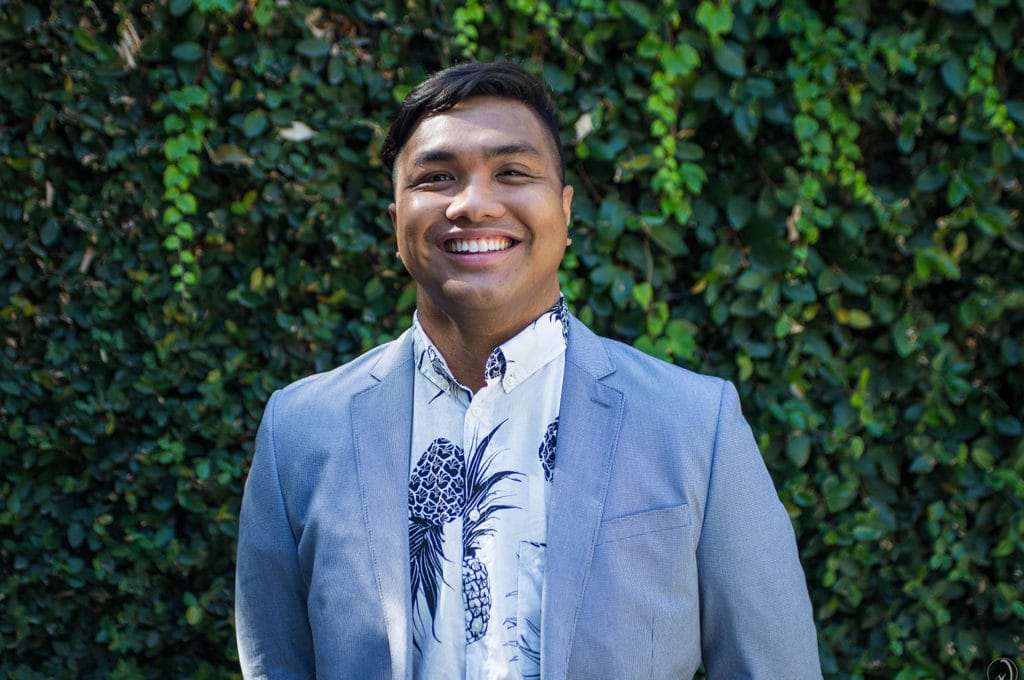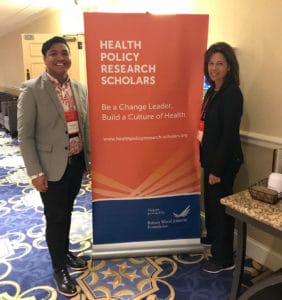New Health Policy Fellow Brings ‘Aloha Spirit’ to Pressing Public Issues

Hawaii is regarded as paradise, but for public health doctoral student Jake Sumibcay, even paradise has some drawbacks.
“For immigrant families like mine, the reality is that we still struggle to make a living,” said Sumibcay, the son of Filipino immigrants who settled in Honolulu before he was born. “It’s especially difficult because of the high cost of living there.”
That struggle, as well as the spirit of family and community that he experienced as a child, have instilled Sumibcay with a passion to serve people—a passion that has resulted in his selection as a 2017 Health Policy Research Scholar from the Robert Wood Johnson Foundation.
The highly competitive award will provide Sumibcay with $120,000 in support for four years, along with networking opportunities beyond CGU—a considerable boost to his graduate journey as he prepares to enter the public health profession.
“We’re thrilled for Jake. The RWJ Health Policy Scholars Fellowship is a terrific complement to the doctoral program of each scholar at his/her home institution,” said Sumibcay’s faculty mentor, Paula Palmer, an associate professor in the university’s School of Community & Global Health.
Palmer commended the foundation for providing interdisciplinary training in health policy translation, health equity, leadership, population health, and communication, which will prepare the scholars for future careers in health policy research.
“A unique feature of the program is the networking opportunities with key public health and industry leaders across the country,” she added. “Serving as Jake’s mentor has been rewarding due to his intellectual curiosity and motivation to reduce health inequities in underserved communities.”

Sumibcay, who is already the recipient of a master’s degree in Public Health from the university, as well as a bachelor’s degree in international studies from Seattle University, said that one of his current areas of research focuses on the effectiveness of health education materials on tobacco, cancer, healthy eating and active living (HEAL) that are targeted for Asian American, Native Hawaiian and Pacific Islander (AANHPI) young adults.
“Among the AANHPI population in general, engagement in health remains relatively low compared to other populations,” he said. But Sumibcay is eager to create new ways to make health education materials for this group “meaningful and increase the likelihood of engagement to inform, advocate and perhaps empower a mindset to find value in health that transcends to the rest of the community.”
Hawaii in His Heart
This year’s cohort of 40 Health Policy Research Scholars includes doctoral students in programs across the country. The program, which brings together a diverse group of students from multiple disciplines, was created to provide leadership and training opportunities to students who, according to the RWJ Foundation website, “by race, ethnicity, socioeconomic status, and other factors … are traditionally underrepresented in doctoral programs and policy development.”
For Sumibcay, such diversity has been an ever-present factor in his life and an important influence on his current career path.
“I grew up at the intersection of multiple cultures,” he explained. “Hawaii is a unique place to grow up because of its ethnic diversity. The mantra we live and breathe is the ‘Aloha Spirit.’ In its simplest definition, it is a mutual regard in treating each other with love and respect regardless of differences. The ‘Aloha Spirit’ nurtures a sense of family and community that allows different cultures to live side by side in harmony.”
That vision of communal harmony—and possibility—has guided Sumibcay throughout his academic career.
During his undergraduate years at Seattle University, he said he had his first experiences with public health efforts. After graduation, he took part in a Seattle Children’s Research Institute initiative called “The Walking School Bus,” which promoted physical activity among schoolchildren in the city.
His experiences with data collection, logistical planning, and interacting with study participants on this and other projects, he said, “became the precursor in my journey to public health. It was a world waiting to be explored.”
That exploration has continued for Sumibcay at the university’s School of Community & Global Health.
Sumibcay has worked on research projects regarding health promotion and cancer prevention that promote healthy activities and tobacco control. His graduate training has enabled him to use a range of methods, including qualitative approaches to using surveys, focus groups, key-informant interviews and community-based participatory research.
Sumibcay said his research interests now are focused on reducing health disparities especially in disadvantaged and underserved communities. One possible solution involves social media, he said.
“As an avid social media user and content creator, I definitely see the value in this avenue to change the way we communicate health, especially as an arena to translate research knowledge,” he said.
As a part of the Health Policy Research Scholars Program, Sumibcay said he looks forward to interacting with public health students and experts from across the field.
“Through the HPRS program, I will be trained and mentored as well as work with other scholars and professionals in the RWJF network,” he said. “This is an exciting chance to align my research towards health policy and advancing the culture of health.”